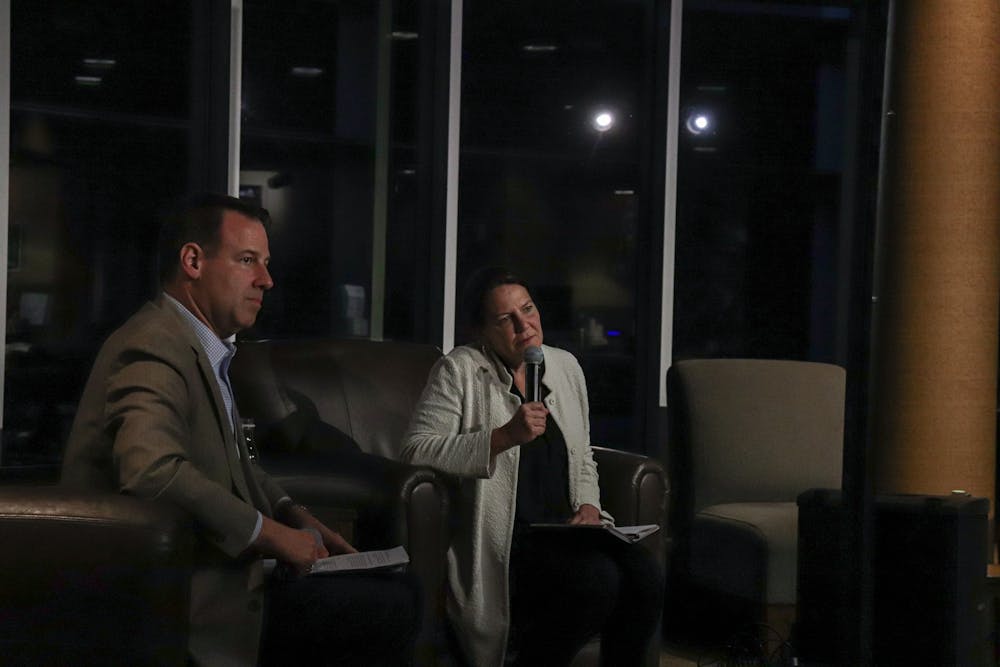Correction: An earlier version of this article misstated that Elon’s E-Alert system was implemented in 2020. While it has been revamped more recently, it was launched in 2007. Elon News Network regrets this error.
Elon University President Connie Book said the number one well-being problem traditional college students face is loneliness. The Student Government Association hosted a fireside chat on March 29 where Book and Jon Dooley, vice president of student life, addressed this concern along with other student’s questions.
The event follows the recent election results for student government positions. Members of SGA asked questions regarding mental health, student involvement and housing. Dooley prepared questions in advance and invited attendees to continue the dialogue and ask more questions.
One topic addressed was the mental health of Elon students. In addition to reminding students of resources provided by Elon, Book also emphasized the importance of community.
“Loneliness is a precursor and if loneliness is not intervened, it can result in significant mental health issues,” Book said.
Book also said Elon has more positive data compared to other universities. She attributed this partly to the versatile campus with the ability for outdoor classes and limited time online during the pandemic compared to many other universities.
Book turned the conversation to the audience and asked about struggles faced by Elon students. Students brought up various challenges, including a shortage of tutors for higher level courses, time management concerns, lack of an on-campus psychiatrist and struggles to fulfill graduation requirements.
One student addressed a specific struggle many students have with feeling over-extended, including participating in extracurriculars, having a job and maintaining a good GPA.
Dooley responded by emphasizing the importance of students taking time for themselves and not overcommitting to activities.
While some students are feeling overwhelmed by extracurriculars and campus involvement, Anya Bratic, student senator for the Class of 2026, addressed students who feel like they don’t have a place on campus.
“What are ways in which we as Student Government members can increase inclusivity for students who don’t find themselves involved with as many things?” Bratic said.
Book referenced the pandemic and how it side-tracked a lot of the engagement efforts for Elon. She encouraged community and active efforts in making peers feel welcome.
“It’s a well-being initiative,” Book said. “The more our community is tending to each other, the better we can be at this.”
Book also addressed new academic programs that have been added to Elon in the past few years, including nursing, engineering and business analytics.
Book said Elon allows students to pursue any major, which contrasts schools with a second-tier admission process where students apply to individual schools within the university. In addition to this aspect, Book reminded students of the growing curriculum at Elon, including new majors and minors that are being considered for approval. Recently approved new interdisciplinary studies include public history, food studies and financial technology.
A similar discussion continued on the expansion of Elon’s scholar programs.
“Last year we added innovation scholars, public health and nursing the year before,” Book said “We love the cohort model. Students who participate and come in with their cohort have a great way to involve themselves as soon as they’re on campus. The Business Fellows will also grow this year, and we’ve added the Voice Scholars for choral performance.”
The conversation shifted toward the growing student body at Elon. Book addressed enrollment growth and Elon’s slow growth model.
“Every year we are trying to accept an additional 25 to 30 students,” Book said. “The reason to do that is because every year cost increases, and we’re trying to not put all of the pressure on tuition but rather add some growth to the mix to help cover costs.”
Dooley addressed the housing concerns with these increases. He noted some of the plans to expand housing, including an additional building in the East Neighborhood and housing at Loy Farm.
“We didn’t anticipate that we would have more students who want to live on campus than beds and rooms for them to live in,” Dooley said.
One student asked about Elon’s approach to mass shootings in light of recent events. Book acknowledged current efforts by Elon, including active-shooter response training which is made available to staff on an annual basis.
She also referenced Elon’s E-Alert system, which was implemented in 2007. Book noted how it had been used after a pro-Trump political convoy on campus led to security concerns for students in 2020. These concerns stemmed from some vehicles in the convoy driving by shouted profanities and slurs. Elon’s E-Alert system notifies students about urgent news, emergencies and inclement weather.
One student asked if there were plans to hire additional faculty in regard to issues with enrolling in classes. Book pointed out that the waitlist feature for students is important, because new sections of classes may open as they add sections based on demand.
Book and Dooley invited students to have individual discussions after the Fireside Chat concluded, in order to address any further questions.


